The Zodiac and the Human Body. (216).
Transcribed by J. Bailey
With diagrams, tables and arbitrary headings by J. Bailey
Square brackets [ ] contain editor’s notes.
Efficiency
... yes, well we don’t want to prematurely come to conclusions which might lead to a hasty formulations of solutions to problems.
You know, the tendency is to seek for some sort of instrument that will give you a quick solution of a problem. For instance, a friend of mine in Manchester, a psychiatrist who more and more and more has turned into shock treatment, because it’s quicker and gives a very, very quick solution of the problem. He is actually a Jungian psychologist and used to take a considerable amount of time over each patient. The more patients he gets, the less time he has for each, and the result is that he tends to be more and more economic in dealing with them.
And the natural tendency of human beings is to want to be efficient, and in the process of wanting to be efficient to come to a quick solution, and find an instrument that will give you that quick solution. And the moment you think you’ve found it, you stop looking for anything else, and it can produce very, very superficial results.
You can get results that way, like you can with shock treatment1. You can blow away a problem physically, but it hasn’t solved the problem and the person has to be re-educated and later on will have to re-face the same problem ... perhaps with inferior equipment. That’s why I don’t want to take this idea of disease types — for instance in relation to the zodiac or other forces — and over-simplify it.
Grief
We’ll start with this grief problem,
because it throws a bit of light on it.
Supposing we take the letter ‘G’ and we’ll draw it in as a solid. Now, our form of the letter is like this, isn’t it? Lets shade it all in, and use that to symbolise what the Greek Gamma or Yorkshire Gamma means when a thing is all gamma’d up. Now, the idea is that the sound ‘G’ is made by closing the gullet. The same hard ‘G’ in gullet right at the back of the throat you just stop it with the tongue [makes the sound with the tongue]. Now that is the idea of this letter ‘G’ [pronounced gay]. We shouldn’t really pronounce it ‘jee’ to get at this idea, we should pronounce it goh, gah, go, ge, not dje ... dje is already a softening, an Anglicising of it, because to English people this problem is no longer so difficult, because living in a small island their evolution is accelerated tremendously, so that relational problems are much easier for them than for many other peoples.
 So if we take this letter ‘G’ as a
hard ‘GE’ [pronounced gay), equivalent to the Greek Gamma
which is
So if we take this letter ‘G’ as a
hard ‘GE’ [pronounced gay), equivalent to the Greek Gamma
which is written like that, like our letter ‘Y’, and frequently
confused with it in manuscripts. It means the gross material object
of our attention. So if we just draw a circle, put the letter ‘G’
in it like that ... that’s this form of it, you see, when we draw
it carelessly up to there, but it’s really the whole circle cut in
half, shaded to represent matter. That is then a gross material
object.
written like that, like our letter ‘Y’, and frequently
confused with it in manuscripts. It means the gross material object
of our attention. So if we just draw a circle, put the letter ‘G’
in it like that ... that’s this form of it, you see, when we draw
it carelessly up to there, but it’s really the whole circle cut in
half, shaded to represent matter. That is then a gross material
object.
Now this line across here signifies that the object so made has parts. And it is these parts in it that make grief a possibility. Because grief simply means that the two halves are separated. Now let’s suppose that this represents a husband and the husband has parts. That is to say, in the mind of his wife he is a: bread-winner ... bottom half, and top half, kindly understander of her whimsies.
You see? ...the two aspects of the
ideal husband.
Now if she discovers that this essential gross material object of her affections starts coming to bits so that his understanding drifts away and his gross material bread-winning part drifts away, and there’s a hiatus between, then she experiences grief ... that is, simply the psychological state that comes when something upon which you have leaned as your security begins to disintegrate. Now that’s a very important concept, because it means that wherever there is grief, there has already been a mistake on the part of the grieving person ... identification with a finite gross material object, and leaning on that object as a means of security, as a means of happiness.
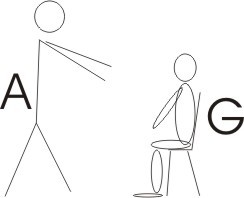 So that if we take one person there [A]
and here is another person [G] and this person [A] thinks that this
person here [G] is essential to the welfare of that person [A]. So if
we call this A and that G for the gamma.
So that if we take one person there [A]
and here is another person [G] and this person [A] thinks that this
person here [G] is essential to the welfare of that person [A]. So if
we call this A and that G for the gamma.
If this person [A] thinks that that person [G] is essential — when it is not, because they are two separate beings — and then some events come and disintegrate this being [G] or take it away, this being [A] will experience grief. So it is really a proof of idolatry.
To experience grief at all, is evidence that the griever has been idolatrous in some measure. I know that this sounds a very, very hard thing to say, but it is true. And if you think about it very carefully, you will find that on the occasions in your own life when you have come to grief, all you have experienced is the vision of something you considered necessary for your life ... disintegrating.
Now let’s come to consider just what
that gamma’d up thing is. We started off by making a big circle,
which is the Absolute coming in to make a universe. And then that
same thing went in again to make inside the universe a subtle form,
and then inside that one to make the gross form. Now there’s your
gamma in the middle. If you like, we can make that the pupil of the
eye and these striations are the iris of the eye. This is how you do
iridiagnosis incidentally, from first principles like this. [07:03]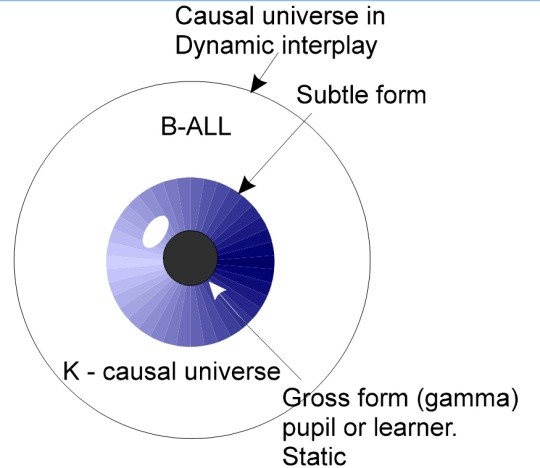
This white ball here represents the causal universe. We’ll put ‘K’ in there for causal. That ‘K’ there really means this boundary, and it represents white, which is the equilibration of all colours, and is the white of the ball of the eye. Ball is B-ALL, it is that which contains the all. And the striations on the iris represent all the colours that are mixed in the white, only now separated out and displayed. And the black in the centre — which really you know is a hole through which you photograph the world — is the pupil or learner. So we’ll write the pu-pil which is the learner ... and that is the gamma’d up or incarnated consciousness.
Black and White
And black is the mixture of all the colours of the iris in static mixture. White is the mixture of all the colours in dynamic interplay. If you get the colours of the spectrum and put them on a piece of cardboard on a wheel and paint them separately round it in certain proportions, then rotate it, you will see white. If you get the same colours and mix them together on a palate and paint it you will get black. So black and white are the same, but in the case of the black it is a static mixture, and in the white, a dynamic interplay.
Now in the same way we can see that because this gamma’d up centre — this gross material centre — has nothing in it other than that which was in the white All, and came through radiation inwards — the striations of the iris — to be established ... that if you destroy that gross material body in the centre, you have not destroyed the striations, which are the formal, displayed colours that were hidden in the pupil. And if you destroy the iris you have not destroyed the ball. And all the colours of the iris are in the white in this dynamic, mixed manner.
So that in effect, you can say that to grieve about the death of a gross body is already a proof of misunderstanding of the fact that it came from the All by an internal process of inner radiation, to be established. And this is the universal — the white — this the particular [black], and when you disintegrate the particular, all you have done is restate the original, universal condition of it.
So here we have a diagram of the three states of the being again. We’ll do this diagram again because it is very important.
Three Types of Stimuli
Now we’ll do this diagram again, because it’s very important. And we’ll relate it to three different kinds of knowing.
Gross Physical Stimulus.
So if we take this, the gross material body, and imagine a stimulus from outside hitting it, producing a reverberation within the gross physical body, we can call that a sense reaction to a stimulus, and say that is the level of your consciousness when you are awake, concentrating on the reactions of your physical organs to external stimuli.
Idea Stimulus
There’s another kind of stimulus that hits you on the level that would be the iris in the eye, and this is hitting you on the ideas in your body ... as when we are talking now the words go in through the ears to certain centres and impinge on groups of ideas. That’s a stimulus, not like hitting you on the body with a stick, but hitting you in the ear with the word which goes into a centre in the brain and rouses similar ideas.
And you’ll notice the difference here. If you take your fist and hit somebody on the eye very hard, the eye will go black. If you hit somebody with the word, it will go into the ear to a certain centre in the brain, and will there produce a peculiar process of mixing of energies which for the time being will blacken. That is, you can get a black mental eye ... that is, you don’t understand it.
On first presentation, an idea forcefully presented, on first presentation, simply blacks your soul eye. And it will take time for your idea circulation — just like the circulation of the blood in an ordinary physical black eye — it will take time to circulate this mental blood — if you like the analogy — to clear away the damage that has been caused by the newly introduced idea. So that would represent the idea level.
Will Stimulus
But you could also be stimulated on this level, which is the level of the will, because that ball is also the ‘Vol’ or volition.
Three Modes of Stimulation
So there are three ways you can be stimulated:—
On your gross, physical body by hitting you with a hammer.
Another by hitting you with an idea, usually through the ear, but it can be done by geometrical symbols through the eye, and through written words.
And this method, hitting on the will. The most obvious illustration of this is simply to insult a person. Cast doubts upon their strength. Just say, I think that you’ve got a weak will. Now immediately, because that is the outer limit of your being, that band of the will, the reaction is to say, Well I haven’t. You are not concerned with defending an idea there; you’re concerned with defending your will, your own Self centre.
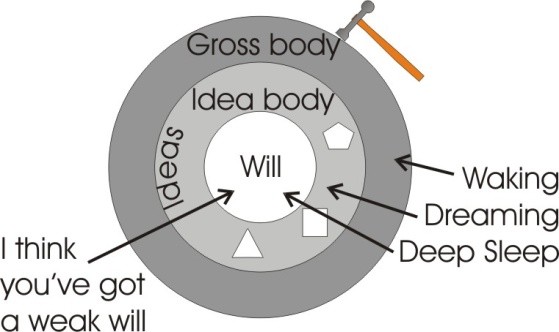
Here [gross body], you would defend your physical body.
Here [idea body], you would defend an idea.
Here [will body] you simply defend your being as a will.
Those three processes correspond.
1. The waking state of an individual
This one with the waking state of an individual. I’ll put individual there, I.N.D., individual, because it is very important to realise there’s nothing more asleep than that waking state of the individual. Because if I can only know a thing because it taps me like this, then that is a very external mode of knowing. It’s what we call generally the waking state. But that ‘K’ in wake itself symbolises — there’s the plain of your being [I], and there’s the vector hitting it [<] — the stimulus. So that the waking means that you have been hit. This WA here simply means a force [W] going [A] and hitting you [K]. So the waking state corresponds with a blow on your gross physical organism.
2. The dream state
The dreaming state corresponds with the state when your ideas are hit, and you have forgotten the physical body, as you do when you go to sleep and begin to dream you forget about your physical body in bed and you shift the accent of consciousness from the gross body into this zone, when you are presented with ideas, and they, removed from the ballast of the gross body, can play themselves out in highly fantastic ways.
3. The state of deep sleep
And here is called the state of deep sleep, and that deep sleep is the state in which the individual here can remember nothing of what has gone on. And yet that deep sleep state is really more important than the waking state. [15:22]
Because you know that when you are in a state of deep sleep and not dreaming, your body is being intelligently repaired from the damages you have done to it during your waking state. So throughout the daytime, when you are being hit on the gross body by stimulation, various damages are being done to your organism, and if you remain in identification with your gross material organism, the damage will become rapidly so great that you would die. You can kill a person by simply not allowing that person to sleep. They then cannot go into the state of deep sleep where the real deep repair is being done.
Experimentally it takes about five days to kill a dog by not allowing it to sleep, whereas if you tried to starve it to death it would take weeks ... if you allowed it to sleep. And this shows you which is the more important ... the sleep or the food. Something goes on in deep sleep that the individual does not know about, which is an essential of life.
Now, in the dreaming there’s an awful lot of activity going on, and you can waste energy there so tremendously that you can wake up — if you haven’t managed to get into the deep sleep state, which is the state of the unity of your Will — you can wake up, that is come back into the gross body identification more tired than you were when you went to your so-called rest. [16:50]
So it’s essential to learn how to get from the gross state into the state of the Unified Will which we call deep sleep.
The Fourth State (of TWRIYA)
Now if we put those three together, we haven’t got a word in English for them, but we have in Sanskrit ... the word is TWRIYA. Now that state twriya is called the fourth state, which is simply the unity which is lying behind these three states. [17:20]
Because you can see that if ...
one moment you are awake in the gross body.....
then you are dreaming.....
and then you are deeply asleep.....
.... there must be a sub-stratum state linking these three together.
That substratum state is this TWRIYA.
And you can see that it means the affirmation [YA] of the TWR,
the LAW, which is really doing this, alternately, you see? There’s
your so-called night-time. I’m mending myself, and I am dreaming,
and I am waking up in the morning in identification with the gross
material body. Then I start to dream again the next night, go into
the deep sleep, come back again into the idea world ...
identification with the gross body. Next day dreaming, deep sleep,
deep sleep, dream, gross body, and so on.
dreaming,
and I am waking up in the morning in identification with the gross
material body. Then I start to dream again the next night, go into
the deep sleep, come back again into the idea world ...
identification with the gross body. Next day dreaming, deep sleep,
deep sleep, dream, gross body, and so on.
Now, the whole being is this TWRIYA. This turiya is itself, if experienced, the simultaneous presentation in consciousness of what you call your waking state — gross body stimulation — plus the dreaming about it — that’s all associated ideas — plus the unity of the Will which lies behind it. And that is really the thing to aim at. [18:43]
Modern Psychoanalysis
You know that when a person is undergoing psychoanalysis or something like that, they are usually driven back by free association — a verbal technique — and today, partially with the aid of drugs, but that is only because of the deficiency of the practitioner who very often cannot manipulate the technique without the aid of the drug. And the object is to drive a person from the gross body identification into the dream belt ... because psychology today does not recognise this pure Will as subject to research. Depth psychology only goes up to this limit of the dream. It doesn’t go into there. This is one of the evidences that it’s still in its infancy. It’s only a few years ago since Freud died, and the identification with the gross material body as a hedonistic structure of sex-pleasures there; the attempt to climb out, the Adler function; the attempt to go beyond by Jung failed in himself ... he was blocked by his own analytical processes.
Because you must realise that outside the band of ideas all you have is pure Will. That Will is not a synthetic Will made of ideas ... it is the original, prior Unity before you ever thought. It is eternal, completely indestructible because it has no parts, whereas your ideas are destructible because they are analysable. We can destroy an idea by analysing it.
There is your gross body — that’s the most easily destroyed. Just drop a few bricks on it.
Then is the body of the ideas — that is also easily destroyed, by logic.
This one [the Will] — you cannot destroy it.
So if you cannot convert it [the Will] to your way of thinking, you cannot get at it at all. That is the meaning of Eternal Damnation. If you do not catch the Will of a person and get it to agree with you, you’ve wasted your time trying to get an agreement of ideas or of bodily action. Because if the Will of that person is not with you, everything else is superficial.
Now you see that this diagram represents the gross body inside — then the subtle body — then the causal body. This subtle body, or dream form body, is intermediate between the two.
Now most people tend to think of it in reverse.
1. There is your centre. That’s corresponding with that [the Will].
2. There is your dream world round it.
3. And there is your gross body round that.
Both these diagrams are legitimate. Gross body on the outside. Dream body inside that. And Spiritual Causal Self inside. So we can put them into correspondence like that. See?
When Christ says, The kingdom of heaven is within2, he did not logically say, It is not without. We go in, because it is easier to get at it on the inside than the outside, because if you go out, you tend to get absorbed in physical stimulation. You don’t have to ... you merely tend to. Because the general flow of the nervous energy in your body in this period of human evolution is into the five senses.
So if you allow yourself to look out at all, you find that you are looking at gross physical objects. You don’t have to ... but you tend to.
Subtle World Exercise
You can look at people in another way. You can focus on the subtle world, the world of your dream, and if you do it consciously you’d call it a daydream. And you can then look at somebody, and instead of seeing the gross body, you will see the body of ideas of that person. And if instead of doing that you pitch yourself in your volitional centre as pure, unformulated Will, and you look at them in that manner, what you will see is their pure Will state ... their motive. You will see either they like you or they don’t. And the first thing is to try and convert the one to the other.
Converting the Will
[1st questioner] How will you convert the Will, then?
Well, of course the only way you can convert the Will is ... you know Christ says, If your brother is about to take you to law, you’d better go with him and sort it out before hand. Don’t get before the judges if you can avoid it.
Don’t get into the idea world, you see? — Those are the judges.
So He says, Go with him in the way. Go with him. If he wants you to go one mile, go two3. The only way you can captivate a Will is by going the way it wills you to go ... not any other way. Some people think it’s a life’s job, you know, going the way of somebody else’s Will. Really their Will tires a lot quicker than most people would suspect, because they are in general extroverted, and therefore subject to external stimulation. So that if you start going with them, their mind will vacillate and they will slip out of the Will into the idea. And when they are in the idea you can feed an idea at them which captivates their Will. But remember you can’t catch a Will unless you send it in the direction it wants to go. But you can put up sign-posts to say, It went that way. [audience chuckles]
The whole thing is a question of what Khen would show you, called misdirection of attention, with a pack of cards or something like that. When you’re fiddling with the right hand, you hold the left hand out and display the ace of hearts or something.
[1st questioner] I understood that to mean then that he may have ideas about them but his will is not in that direction ...?
Well, you know that that is true because in general most people have had roughly the same elementary education, and yet they haven’t got, after it, the same Will. You see, the established direction of individuals at birth is largely the result of their ancestral directions. So that already they are biased in the Will towards one or other of the departments.
Psyching
So that if you can see in which way a man’s Will is going, and you can do if you balance yourself in your Will and don’t speculate. Don’t get ideas about it. Just feel it.
[1st questioner] This is psyching now, isn’t it?
Yes. The psychometric technique of a spiritualist medium, or any really fine feeling, is of the same order. Just feel the motive. You can often see, if you bother to stop in conversation, you can feel I am beating my head against a wall with this person. He doesn’t like the idea.
Last night we had an example of a person that didn’t like the word responsibility. And it was a woman, and she kicked mightily and scratched and bit and generally tore the place to pieces, because she had been told that she had self-control. And she didn’t want it. She hadn’t had it for years, and she didn’t want it now. And that is an example of a mind complete with ideas — all about truth, beauty and goodness — being pushed on one side the moment it is shown that understanding may defeat your Will. [26:30]
If you say that, if I understand a certain project, well then I cannot do so-and-so and so-and-so, and they are pleasurable, then obviously if you want to do them you will say, well I can’t understand them! And it has to be realised, this. That if you are talking with somebody, you will see a certain expression in the eye, a certain set in the mouth — those are the gross material indications — if you identify with those and then feel the state of Will, you will discover that you cannot put that idea over in that form to that person. What you can do is change the form of the expression.
For instance, I know a Communist friend of mine; if I utter the word democracy, he goes pish. You see? So I don’t use the word democracy to him. I talk about the intelligent overthrow of the fantasies of the bourgeois, whereupon he says, Jolly good!
Now he’s been conditioned like a Pavlov dog into a series of reactions on hearing certain terms. And he’s prepared to discuss that. And he’s even prepared to admit that he does have these conditioned reflexes, but he says that the ones he has are true, because they came out of Marx. [27:52]
The Zodiacal Man
So now we’ve got a process here. We’ll just have a look at this in its simplest form.
We can take the Zodiac and put the sign of the Ram at the top. And a fish there. And put a man’s toes there [on the fish, Pisces]. And we can put his knees on the sign of the goat, you see. And we can put the generative organ there, on the sign of Scorpio. I hope this is a good figure when it is finished [indicating his drawing, the one on the following page is an attempt to replicate it]. I’m sure it’s going to be very funny, look, we’ve got the head around there.
The neck there for Taurus and the shoulders there for Gemini. And this chest part for Crab [Cancer]. And the Leo part on that Solar Plexus. And the Virgo part here for the intestinal departments. And the Libra part on this pelvic ... he’s a funny fellow isn’t he? Not bad, I’ve seen worse. There we are. There he is bent round the Zodiac.
Food
Now this is not entirely arbitrary. There’s a certain relation between these things. So that if we place the primary energy of the head — head is HE-AD, spirit-eater — and up here there are certain centres that actually eat spirit in the same way that the lower regions of the body have to get their energy out of gross material food.
You can get energy from gross material
food. You can get energy from the air. Actually, if you get air
radiated by sunlight, it’s better quality air than air out of a
damp, dark cave that’s never seen the sun. And you can also get air
itself feeding backwards into the nervous system, where a relation
from the gross material chemistry here in the blood, carried up,
meeting the oxygen, supplies a special kind of energy which goes up
there and absorbs impressions through the sense organs and eats them
in the same way ... but at a finer level, a higher frequency. [30:21]
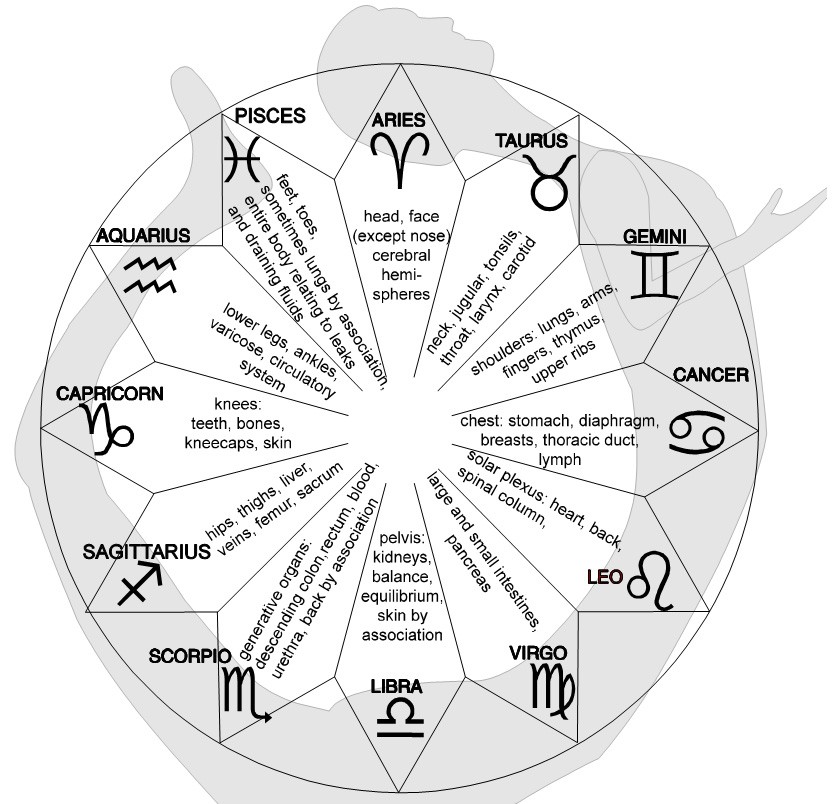
So that when Christ says, I have food ye what not of4 to his disciples, he’s actually saying that he derives energy from up here and that if you get it from there, you don’t need much of it down there, unless you want to anchor your body a bit on the ground. If you get none at all you’ll disappear.
As a matter of fact, if you were to meditate on the Absolute Truth and not eat gross material food at all, you would not cease to exist, but your body would become highly attenuated — glorified it would be called in the religious sense — and it would then become a body of light. It would just shimmer away and become invisible, something like the transfiguration on the mount. That can be done either temporally or partially — as in the halo or aura and so on — or permanently. [31:19]
A Warning to Guard Against Over-simplification
Last week we were talking about different kinds of disease, and now we’re going to consider some of the relations here, to show in what peculiar way these things can be related.
But I want to remind you now, very carefully, we are inside the whole universe just like the ball, and then the iris and then the pupil, and this pupil itself is segmented into individuals of the same line of the human race — as far as we are concerned — so that Each individual will be a tiny little square.
So inside this gross material centre of individuals, the forces are already tremendously indebted to the forces of the Logos or idea world, and of the causal one. Now this itself is — as idea — the sidereal band. This band outside here on our other diagram which we reverse, would be the internal solar force ... the force of your will, inside.
I’ll just draw that again to make sure we don’t forget. There’s the light of the Will inside, there’s the ideas round it, and there’s your gross body [around that].
Now, you are indebted to the Universal Will to begin with, and you cannot break it. That is to say, you are going in a certain direction determined by the Universal Will, whether you like it or not. If you find out in which direction it is going, and decide you will go with it, you’ll have a harmonious life. If you don’t like where it’s leading you and you kick against the pricks as Paul says5, you will find it’s very, very hard, because you cannot defeat it, because you are in-ferior.
Inferior — means you are inside it, doing inside. Superior — is that which is right on this [Will] band, here. So the control is always with the superior. And the inferior has to do ultimately what the universal wants it to do.
So we have this Universal Will conditioning the whole internal process. Then we have the whole of the chemical bands from the stars which, radiating their light inwards onto the earth — whether of the terrestrial globe or of my body, it makes no difference, it is the earth receiving these radiations — and then, engrammed in the tissue of every individual are the reactions of every one of his linear ancestors, male and female, right back from the foundation of the earth.
Freud and Early Traumas
So there are a terrific number of highly complex forces at work, and this is why we must not try to find a very simple little tool that will give us the solution of any given problem. If we over-simplify the tool, we will find that we cannot avoid what the Freudian psychologists found always ... namely a regression of the problem.
You know that Feud thought very often in his early days that he had solved the problem, because the patient recovered. And a fortnight later the patient came back and said, well I’m not recovered any more. So then the patient is re-analysed and it is found that the first analysis was true only as far as it went, and there was another thing underneath it. And it was then pushed back relentlessly until he came to the theory of the birth trauma.
The shock of birth, said he, is the real trouble.
But even that wasn’t true, because there is a shock, pre-natally. There is actually a shock on the egg, on the penetration of the sperm ... and that shock is felt. But that is only one of countless shocks that the same germ plasm has suffered through the ancestors. [35:31]
The Ring Pass Not
So you have to see that when you are pushing a thing out of the gross world in to the idea — this is the analytical process of the psychologist — you will come to a band. This, in magical parlance, this band is called the ring pass not, because you cannot analyse beyond that ring, because what is beyond it is a pure Unity of Will ... not subject to analysis.
You cannot analyse the unific Will.
The psychologist therefore, when he comes to this reason for a disorder, is always confronted with something that he can’t solve ... namely the Will, which has no reason whatever for being ill. It has just willed it. In the same situation it might have willed to behave itself. In some cases it wills to misbehave itself, and pays the price in the hope that it will eventually force everybody in the environment to obey it.
So that when all the analysis is
completed there still remains this ring of analysis. The
subject-object zone here can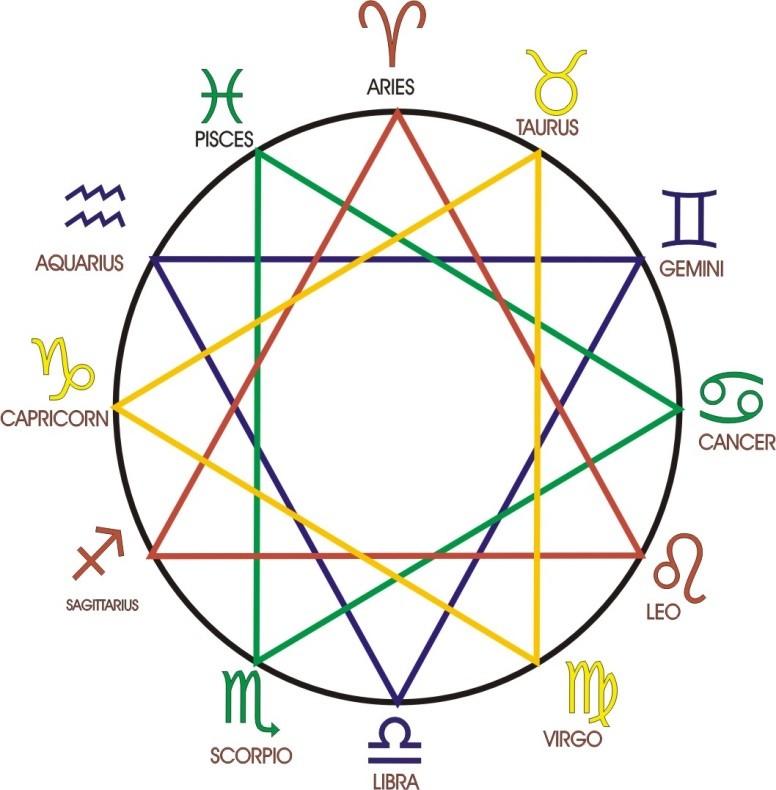 never tell us about the unity of the
Will. There is the unproblematic source of the problem. A problem is
always something you can probe and that proves that it’s a P-Robe,
a PI-Rational structure. And if it is subject to analysis and is
therefore a problem it cannot be solved. To solve it is to wash it
away, wash away all the form and come back to the elementary thing
behind it [that] the person has Willed, unproblematically.
They just willed it, like Shakespeare makes Caesar say, The
cause is in my Will6.
never tell us about the unity of the
Will. There is the unproblematic source of the problem. A problem is
always something you can probe and that proves that it’s a P-Robe,
a PI-Rational structure. And if it is subject to analysis and is
therefore a problem it cannot be solved. To solve it is to wash it
away, wash away all the form and come back to the elementary thing
behind it [that] the person has Willed, unproblematically.
They just willed it, like Shakespeare makes Caesar say, The
cause is in my Will6.
This is why we have to capture the Will of the person rather than the idea, although we may have to use the idea because the person has Willed to believe in certain ideas. So with that to remind us to guard us against over-simplification, we will consider this gentleman bent round the wheel again and we’ll put the zodiac back and we’ll see the relation between these pairs of opposites.
Aries
This sign of the Ram here ... Ram is
Hebrew for ‘high’, the original source energy. And opposite to it
is the sign of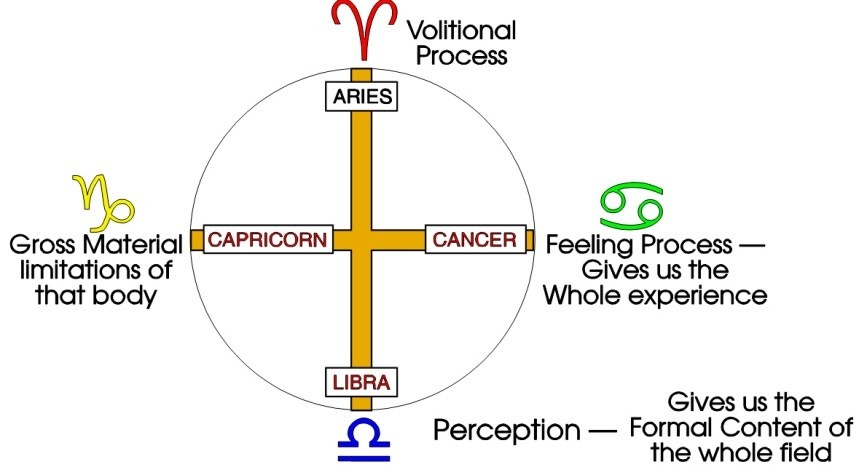 perception, of your senses [Libra]. Now these two are
exactly opposite concepts.
perception, of your senses [Libra]. Now these two are
exactly opposite concepts.
This one [Aries] is Absolute Awareness. It feels that it knows all there is. It is omniscient. But it hasn’t separated any of it whatever. So that it knows nothing whatever. It knows too much, too little. Therefore it says in the Old Testament about it, of this sign, a troop shall overcome him: but he shall triumph in the end7. The mark of Gad. The troop is the troop of stimuli which hit the organism and scatter its unity.
It is essential to see this because here we have two types of possible disorder.
The disorder of thwarted omniscience ... actually Hitler is born just on the turn of the Ram and the Bull, Taurus. So was Shakespeare, so you see, you don’t have to take it necessarily one way. The energy here [in Aries] feels its omniscience and knows that it can do anything, although it may not in particular be able to do any precise thing whatever. Nevertheless it feels that it can do it. And it makes it undertake tremendous things ... for which it may have no equipment particularly. And it feels it doesn’t need particular equipment because it’s omniscient. But nevertheless in the gross material world it is quite powerless, unless it acquires the gross material technique and instruments. So what it generally does is ally itself with a Goebbels and a Hess and a Goering and so on, as instrumental extensions of its own Will, because it cannot do it itself.
If we take the kind of manic depressives in a mental hospital, we find there in the state of high mania, an ascending energy flying out, convinced that it can do anything. And it tries frequently to the damage of its own gross physical organism, because it feels an essential truth ... that it is omniscient and omnipotent. But that is only part of it. It is not only omniscient; it is also, at its gross material reference centre, finite and subject to correction. It has many aspects. [40:56]
Libra
Now the opposite thing is to see too many things, and therefore to feel that I am full of knowledges, I can see what’s going on all over the place, and yet somehow to lack that energy which would drive in one direction if you could put it on an idea.
So this is the sign of the pure schizophrene, of the order say, of Frederick Nietzsche, who is a typical Libra case. His mind was so full of detailed knowledges — he’s the father of modern psychology, actually — and he’s is so aware of his content, that it’s so rich, that he literally disintegrated. He hadn’t got the unifying power to keep all his knowledges together. He was a plural man.
So we have these peculiar kinds of disease which frequently break out, sometimes all over the body in nervous rashes, in little dots of irritation. Sometimes they may come round the waist band, right round the back of the pelvis. You remember that the region of that Libra on that part of the body in this diagram of him going round. So that we can expect that kind of outbreak — if the person is stressed there — a tendency to disintegrate, and the nervousness to appear in a band across that part of the body.
Now we’ve seen that these are two opposite kinds of disorders possible:
The disorder of omniscience/omnipotence ... not wanting to accept that it has a gross material body which is finite and limited.
And the disorder of the very knowledgeable type, who has ‘knowledges’ plural, without any unity principle.
Those are two of the cardinal signs.
Capricorn
Now we’ll take the sign of Capricorn, an earth sign ... and the sign of Cancer, and see that they also have opposites. [43:12]
This one [Capricorn] is concerned with the gross material absorbance of food.
This one [Cancer] is concerned with feeling. So that [Cancer] is a field consciousness, spreading itself out to become aware and this one [Capricorn] is an attempt to drive onto things, to absorb them.
So in these two different types we find a tendency here to have disorders originating in having a go at things, and trying to get the meaning of things, pulling out significances. Just like the belly department will pull out from the gross material food, energies, meanings, chemicals, so this person will try to pull out all the significance from a situation. And when that person feels that the thing is not coming under his control — not being absorbed by him — then he begins to dissipate himself and become diffuse like this sign of the Crab [Cancer] does. [44:34]
Cancer
Now in this sign the person is so diffuse in feeling that they have none of the formal content of that [Libra], none of the feeling of omnipotence of that [Aries], but they are just displayed throughout the universe as feeling awareness waiting for something to happen.
And when that being finds that nothing does happen, then it starts tending to turn into its opposite, and hopes that there will appear something in the environment which will supply it with the object for it to feel. And it will then start drifting, waiting for the object to appear in its environment to give it a centre on which it can rest. And if it finds one...........
[break in recording]
................which appears to give this stimulus needed, and it suddenly converts. Actually we say it passes into the Scorpio position and attaches itself to the object and won’t let go. So we’ll find in here, in an apparently diffuse person, a tendency very, very often to produce stones inside the body ... actually to precipitate them. Remember those stones in any case are only chemicals which were in suspension in your blood. They are driven onto feeling centres in this sign where the person lacks security or lacks the objective stimulus that it feels that it needs.
Those shortly are the cardinal signs.
Cardinal — Fixed — Mutable
Now I mentioned here that this one goes to ... Cancer goes to Scorpio as its second stage when an object is presented to it. And therefore we call Scorpio the sign of attachment [fixed]. It is a water sign, belongs to the feeling, but instead of being diffuse it is concentrated on an object ... very zealous and won’t let go. Now every one of these cardinal signs passes through three phases: its own, cardinal ... then the fixed ... and then the mutable.
Water — Cancer, Scorpio, Pisces
Now if you look at a triangle of feeling there, we have:
1. First the undifferentiated feeling state in the absence of an
object, with all that that means; vagueness of mind,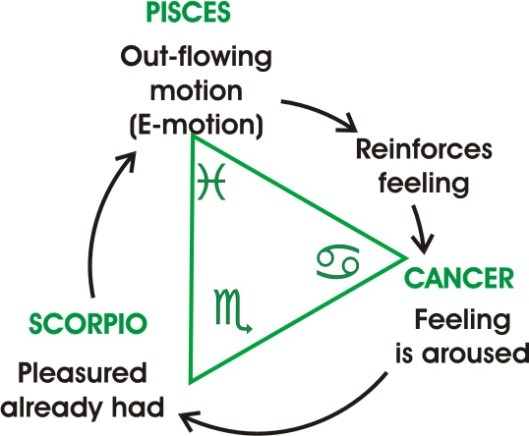 unclarity of
form, inability to define what is the matter with it.
unclarity of
form, inability to define what is the matter with it.
2. And then attachment to an object, a very clear idea of this is what it wants. This provides the stimulus.
3. And then when it is discovered that the particular thing to which it has attached itself cannot pay it all the time, it converts into the Pisces position, and starts looking for other objects. In other words it scatters its feeling.
So, just like a lot of fish in a bowl, if you tap the bowl and they all shudder and dash off ... so the emotions in a person all scatter when you suddenly whip out an object that it has. Attack the object and destroy it or steal it away, and suddenly the feeling which was concentrated in Scorpio flies into bits.
And we may say in passing here that Pisces is the sign of democracy ... a bitty government. Remember we are in that sign now. That came in with Jesus the Christ, the democrats and religionists, and we are passing round this way towards Aquarius. [48:23]
Earth — Capricorn, Taurus, Virgo
Now we’ll just go over here and see what happens in the absorbency of the goat. The absorption here in general particularises itself by accepting a burden, which is a gross material situation. It likes to have things imposed on it. It makes a good manager. But then statistically, the bicarbonate of soda is in general consumed by the managers, you see. The managers are the ones who, because they are absorbing material situations, and because they cannot absorb them infinitely, have to absorb them one at a time. They take on positions of responsibility. The responsibility is conferred on them from above, and they accept it because they simply want the weight of responsibility. It gives them what they need, namely that they are existent in the gross material world ... that they exist. Their evidence for their own being is that the firm will collapse if they’re not in it. This is a very frequent one, actually, of them. It’s amazing when you see, perhaps in the course of a year, perhaps a couple of hundred people born in the same position using exactly the same sentence, I dare not be ill, my firm will stop tomorrow.
We can see in that relation, if we put
here the, put the Hitler position here as an example, we have this
terrific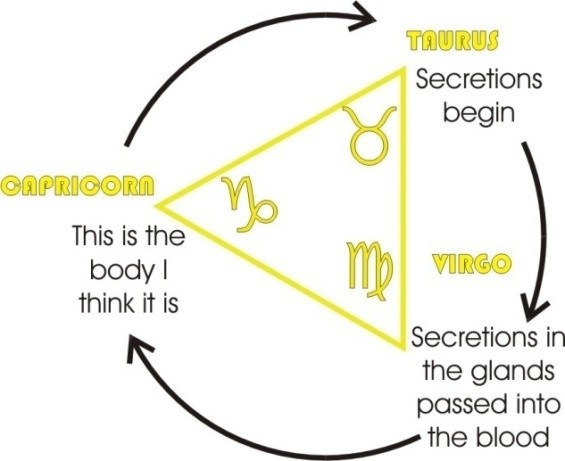 omniscient/omnipotence concept and the assumption of the
leadership ... the weight of Germany. Because if you’re going to be
omnipotent, the only way you can prove it is by controlling the
world. This is the logic of the relation.
omniscient/omnipotence concept and the assumption of the
leadership ... the weight of Germany. Because if you’re going to be
omnipotent, the only way you can prove it is by controlling the
world. This is the logic of the relation.
So when he has done one object and absorbed that, and got the weight of it on his shoulders, he is not satisfied ... he has to go down there and look for more objects. And he then starts circulating about the place, looking for more responsibilities. And he can, actually, if he’s a good, physically strong specimen, carry the weight of a very large combine for, say, five quid a week, and feel that he’s not underpaid because he’s got the responsibility. And it’s amazing how many of them do have this funny capacity of being happy with very inferior pay, providing they feel that the universe will stop if they become sick. That represents that process. [51:05]
Air — Libra, Aquarius, Gemini
Now we’ll take the air position: the perception, unanalysed, of all forms simultaneously. Again, you cannot concentrate on them all at once. So what you do is, you push them into the Aquarian position, and record them in your memory, serially. You are storing up serial knowledge so that you can get at it and work on it separately ... as we are doing at the moment. We’re doing a bit of memory activity. We are perceiving this diagram, remembering what we are talking about, and also passing into Gemini to compare the opposing ideas.
1. We have perceived [Libra].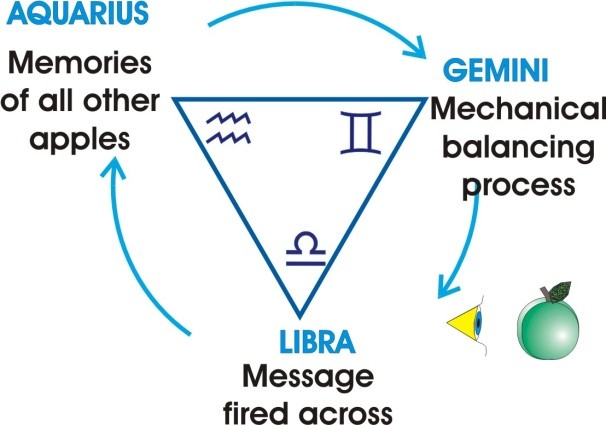
2. We have recorded in the memory [Aquarius].
3. We are now comparing [Gemini].
We complete the cycle. And we keep going round in this manner. We perceive the diagram again. We remember that Aquarius signifies the memory, that the memory has in it all those forms of the universal, now engrammed on an individual sensorium as his individual memory, capable of being played out serially and then put into pairs and reasoned about — reasoning there being simply comparing — whether they are like or unlike.
So we find here [in Gemini] the tendency to disintegration of the mind.
The tendency there [in Aquarius] is to an absorption inside processes in the memory. These people are very, very difficult to get at, because you are talking to them, and while you are doing so about their own problem, they are storing up in their memory what you are talking about, with no intention of doing anything about it. So that you can explain exactly what has gone on and they can agree with you and put it in the memory. We’ll see why in a moment. [52:54]
The Know-It-All
Sometimes it’s a profound dis-service to explain a thing clearly to a certain kind of person without first forcing them to do a bit of work about it, because if it gets in a certain centre in the brain and is understood before you have done something about it, you can’t get the energy out of the understanding part into the doing part. We’ll see that in a moment.
Fire — Aries, Leo, Sagittarius
Now if we go back to this sign of the
Ram, this primary energy here cannot do anything particularly unless
it devotes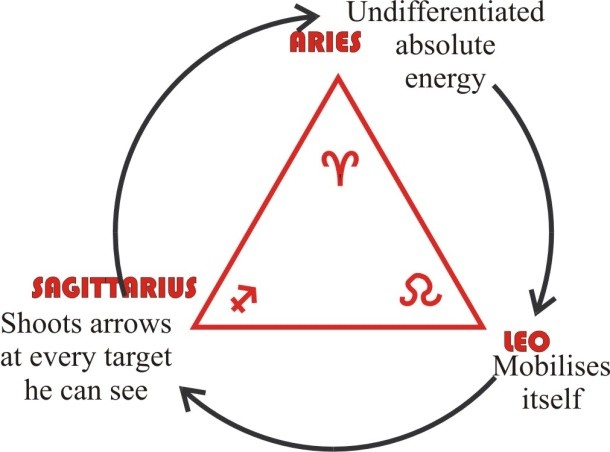 itself in the Leo position, which is the position of
pioneers, you see. They don’t want to do anything anybody else has
done before. They want to find somewhere where nobody’s been. And
they want to go there and make a mark. And so the energy there
[Aries] which is omnipotent and omniscient, here [Leo] is king of a
finite situation. But in every finite situation, it finds that it can
exhaust it fairly quickly. You see, Rhodes goes to Africa and
discovers that Africa is not the universe, it’s only some of it,
and if you’d have lived longer, you’d have had to have go
somewhere else as well. It’s very lucky that we die really,
otherwise ... [audience laughter]
itself in the Leo position, which is the position of
pioneers, you see. They don’t want to do anything anybody else has
done before. They want to find somewhere where nobody’s been. And
they want to go there and make a mark. And so the energy there
[Aries] which is omnipotent and omniscient, here [Leo] is king of a
finite situation. But in every finite situation, it finds that it can
exhaust it fairly quickly. You see, Rhodes goes to Africa and
discovers that Africa is not the universe, it’s only some of it,
and if you’d have lived longer, you’d have had to have go
somewhere else as well. It’s very lucky that we die really,
otherwise ... [audience laughter]
And having exhausted one of those positions, he then goes off here [Sagittarius] and starts shooting arrows at every target he can see, and circulates this process.
|
Energy Type |
Undifferen-tiated phase |
Committed phase |
Breakdown phase |
|
Nervous energy |
Aries |
Leo, by becoming a pioneer. |
Sagittarius. |
|
Intellectual energy |
Libra |
Aquarius, by storing up a nice memory and comparing the results. |
Gemini. |
|
Feeling energy |
Cancer |
Scorpio, by attaching itself to an object. |
Pisces. |
|
Gross-material energy |
Capricorn |
Taurus, by becoming a manager or something or other. |
Virgo. |
|
Table 1 |
|||
So we’ve now
seen in very simple outline how each one of these four parts of the
organism goes through three phases.
1. An undifferentiated phase, here of nervous energy [fire], there of intellectual energy [air], there of feeling energy [water], and there of gross material energy [earth].
2. And that, being diffused in the cardinal points, it cannot operate unless it commits itself into a situation. Either by feeling by attaching itself to an object, or gross material by becoming a manager or something or other, or of the nervous energy by becoming a pioneer, or by storing up a nice memory and then comparing the results.
3. And for each activity there is a corresponding breakdown, and the breakdown is generally related to what you could call the chief virtue of the person. In other words, like a motor car, it is the parts that move fastest, most often, that wear out quickest. So the fellow is likely to break down on his best point. [55:38]
Premature Explanation.
Now, I’ve just mentioned that it is sometimes a bad thing to tell somebody something prematurely. There’s your brain. Here’s your spine. This is the mask which is put on top of the brain [the face] so that the people know who you are, because without it all the brains look roughly alike.
So if we imagine that, I am going to cut this brain —and this is not an anatomical diagram: it is a schematic drawing to show you the kind of thing — and I’m going to draw it as if it were seen from here and here simultaneously. I am going to cut that off [the front part] and call that the intellect. I am going to cut this middle part and cut it into two, and leave this back part whole and put a hole in there for the spine to go in it. [56:33]
Three Part Vocabulary
Logical.
Now when your ear, which is on there,
is rattled with words, messages go in and they are carried to certain
centres. I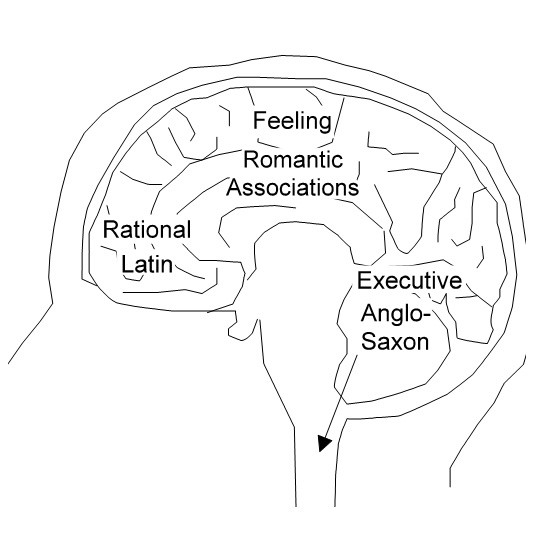 am going to over-simplify in here, but I am going to tell
you that if you explain very, very clearly in logical terms
throughout — one and one is two, and two and two is four, and so
on — the message short circuits itself and goes into there. And
if the energy of that message gets into there [rational brain],
it starts circulating round, and there arises in the consciousness of
that person, I know all about it. Now this is about the worst
thing that can happen to a human being. Because it can happen that he
does know all about it. But knowing all about it is not the
most important thing for a human being ... it’s only one of them.
am going to over-simplify in here, but I am going to tell
you that if you explain very, very clearly in logical terms
throughout — one and one is two, and two and two is four, and so
on — the message short circuits itself and goes into there. And
if the energy of that message gets into there [rational brain],
it starts circulating round, and there arises in the consciousness of
that person, I know all about it. Now this is about the worst
thing that can happen to a human being. Because it can happen that he
does know all about it. But knowing all about it is not the
most important thing for a human being ... it’s only one of them.
He must also be able to feel the significance of what he knows in relation to other beings and the situation. And he must also be able to execute that which is recommended by the knowledge he has. But if he understands it prematurely, it will get stuck in this intellectual centre. We’ll change the name and call it rational centre because the letter ‘R’ also means to disintegrate and it can mean that the person becomes tremendously clever.
We sometimes get university professors who understand the history of philosophy perfectly, and are completely paralysed morally themselves, because they’ve understood that it’s entirely relative, you know ... there’s no absolute morality! and therefore they’re incapable of acting on any basis at all, because all bases have been destroyed by premature understanding. [58:24]
Wilful.
Now the other way is to use words only to do with wilfulness: pushing words, good, fundamental Saxon words, short words. They go flying in to this centre at the back and they go straight down the spine into the muscles. So if you shout a very short-syllabled word at somebody, you generally get an immediate response. If you shout a Latin word, it comes more forward in the brain. If you shout a Saxon word it comes nearer the back. You know the expression, to talk out of the back of one’s head? Well, it means not from your intellectual centres.
This is what you do to soldiers and so on. You say HUUUUUUUU!!!!!!!!!
Now, it isn’t very informative, but it does rattle certain fundamentals to do with the vowel ‘U’ [pronounced OO], which is related to the gullet down below, and it stimulates — and it’s actually done for that reason — stimulates the whole primitive course of consciousness in the body, with the result that it goes from the ear, straight down there into the marching boots.
Now the other way is to talk about things which have romantic associations. You know, instead of saying something like, that piece of green cheese in the sky, you say, Oh, swear not by the inconstant moon ... all that stuff goes in here [romantic brain].
You see, now you have in here, two zones of I like it and I don’t like it. And by playing on the I like it and I don’t like it, and carefully suppressing the mathematics of it, and keeping away from the urgeful parts of it, you could, if you wished, keep somebody in very romantic suspense. So they won’t elope with anybody, but they will become tremendously thrilled with the idea of it, you see.
It’s tremendously important to think that you have a vocabulary of three parts.
You have a vocabulary of rational ideas, which are fundamentally geometric and mathematical.
And another vocabulary of emotional words.
And another one of urgeful words ... most of them rude.
Now, if you can sort out your vocabulary into those three parts, and then deliberately use the one you want, you are being a bit of a Churchill. Because the whole of a propaganda speech is based consciously on selection of particular words at particular times to strike into these centres to produce a reaction which the uninitiated cannot stop. [01:01:09]
Vocabulary Exercise.
And what you have to do initially is to watch yourself, and see how you react to particular words. You can do it in private by writing them down and testing your reactions, feeling your pulse; and you can do it also in ordinary conversation when other people are saying things to you. Ask yourself,
Did that hit me in the mathematical department,
or in my romantic associations,
or in my motor urges?
And when you’re getting more and more conscious of this you will discover that although this diagram is very crude, it is not fundamentally inaccurate, that these things are located in the brain, and that you can get a headache in the forepart of the brain from a different cause from the one in the hind part, or from the one on the sides of the head.
If you go into a mental hospital you will frequently find the urgeful types that are about to knock over a few nurses and tear the bed to bits, running their fingers up the backs of their heads like that. That’s because the centre of the brain that’s activating has discharges of energy going round it ... and these irritate. They actually produce even scalp irritations and the hair won’t lie down. There’s a field there. You will see the hairs sticking up. It will not be smooth. And there’s a genuine itchiness in the brain in those centres.
Remember that word itch, English itch, is the same as the itcheha of the Sanskrit which means Will. Each one of those is a tiny little Will trying to express itself. You’ll find that the urgeful ones are going like this, when their eyes are rolling wide, and then you give them something quickly like a bit of chocolate to get them off it, otherwise they’ll hit something. But if you find them going like this, they are not going to do anything to you, you see they go like this over the middle. They are just having a tizz about Aunt Louise or something. And if you find one going like this, you’ll know that he’s a locked up professor of sub-atomic physics.
Most of them are at the back [of the head] here.
But this diagram in relation to this one, remembering the three phases through which each one of these four parts of your organism go, you have the same thing in the brain. You have an undifferentiated process, and then a split when you’re looking for an object, and then the general scattering for many objects. And it’s this scattering, making many objects, that is the cause of the idea world sputtering out. [01:03:50]
The Three-Part Being in the Physical Body
I want to show you another very instructive thing in the human organism. If we take the toes — one, two, three, four, five — I won’t draw the other leg, it’s too difficult. We’ve got two bones in the lower part of the leg, a little kneecap, and then one bone, the femur, in the top part. And if we take the hand we find exactly the same thing. Five — two — one.
Now, if we take the belly — one — two lungs, and head, put our five pointed star in there [the head] for our five senses, we begin to see a peculiar relation.
We have this wholeness, this undifferentiated will, this prime urge, so difficult to get at.
Then we have the liking and disliking of it ... the first analysis.
Then the five-fold sensorium of it.
And we have the same thing in the upper
arm bone. The part nearest the body is the most unified, then the two
bones,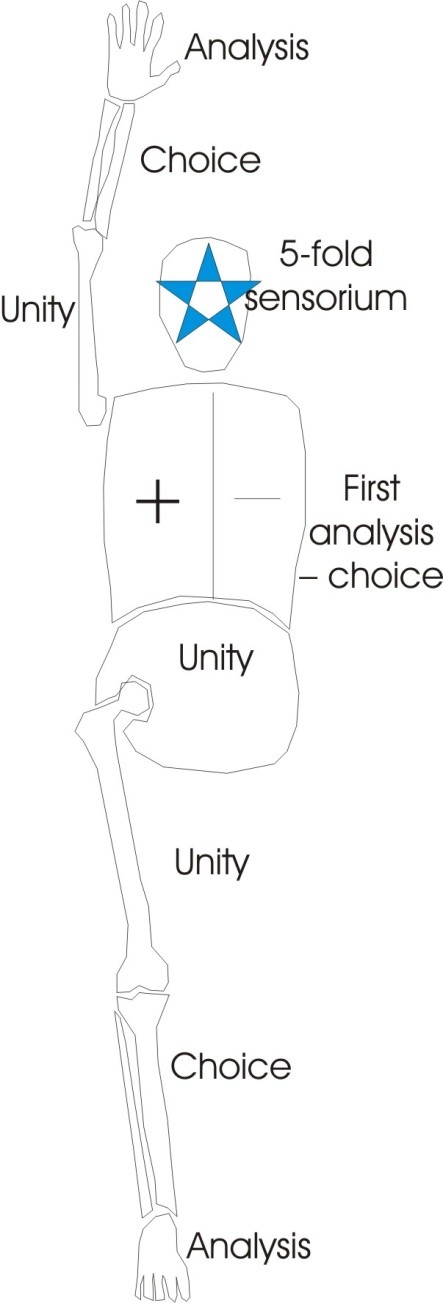 the ulna and the radius there which are the bones of choice.
You’ll find that when people are making up their minds, they are
frequently going like this, unconsciously, rotating these bones. And
then your five messages here.
the ulna and the radius there which are the bones of choice.
You’ll find that when people are making up their minds, they are
frequently going like this, unconsciously, rotating these bones. And
then your five messages here.
And the same with the leg. The one nearest the body unified, then the analysis. And therefore there is a very peculiar relation between the unified bone of the femur, the humerus and the lumbar region here ... the belly. The split here [forearm] and the split into the lungs and here [shin] are also nervously related. And the head and the fingers and the toes.
So we find that the very neurotic type, with fingers modelled and bony — not the soft slushy ???? fingers but articulated fingers — are a sign of an active mind, and you’ll find their toes are of the same order.
And remembering that the head is under the dominion of the Ram which is the nervous energy sign, you can expect to see symptoms on the fingertips there, that belong in the forebrain; on the next joint, that belong in the mid brain; and the lower joint before it reaches the palm, in the hind brain. And the same with the toes.
You see, this human being is simply a very simple trinity, repeating itself over and over again. Whatever it throws out — and remember you started life as an egg, whatever it throws out, budding itself an arm and a bit farther, and five little buds like this and a lovely, chubby hand, you see — all those things are expressed from inside, from the original, potentially five-fold being. The panchikarana of the yogis, the five-fold createdness of the universe is evidenced.
You see, from the point of view of Darwinian evolution it just doesn’t make sense that a human being has got those things and a beetle can be shown to have the same things in a very rudimentary manner ... but we didn’t descend from beetles. But the same forces are trying to manifest through them. The farther away from the body these arms grow, and the fingers extend from the palm and lengthen, the more the nervous energy of the Absolute is pushing itself into the world, and the greater its danger. Because the more you push into the world — the more you extend your nerve lines of communication — the more susceptible of attack you are from without. So the very thing that gives you the greatest sensitivity is also the thing that endangers you the most. [01:07:45]
You find that the most rudimentary types, the simple belly-boy, you see ... imagine a boy who is born — sometimes they are — with a nice big belly, and his head is all one piece with it like this, and his chest is sunk in it there, you see. Now he’s only got one bone on his leg, it’s a thigh bone, and no toes. He’s got a humerus and no lower arm. Now such babies occasionally are born, you see, and they look a bit like that. They are never unhealthy. They are never unhealthy, because they are not pressing out into the world, and therefore they’re in no danger. They’re all of a piece, quite unified, they only want to do one thing ... and they’re usually very efficient at it.
As a matter of fact, Elizabeth here, working at Condover, where these little congenital specimens this shape you see, she finds they have a very, very happy life. It’s just that they make everybody else unhappy ... because they are so rudimentary that they have no problem. Because a p-roblem is a rational structure and they haven’t bothered to make one.
Now, is that fairly clear in general outline, and are there any particulars ... are there any particular questions you might like to ask about it? [01:09:09]
The Boy with a tendency to Birdness
[1st questioner] It’s a common medical term to talk about schizophrenic hair, isn’t it?
A bit like mine at the moment.
Well, you must realise that every material particle is surrounded by a field of energy, isn’t it? Now you know that your hair will stand up a little ... a wave that nature’s made it to stand up when you get scared and so on. You look bigger and frighten the fellow that frightening you. Well, there’s definite field energy there, which, under certain conditions of emotional excitement can produce an enlarging of the being of the subtle body, which tries to draw out the physical body into the same dimension. And it causes all the parts that are loose — like hairs and so on — to radiate into the field, just like iron filings into a magnetic field.
You know how, when you get a bit of brown paper and warm it, put it on your arm, pull it, put it over your hair ... your hair will stand up, won’t it? The same thing will happen without, in certain conditions of emotional excitement. Sometimes, hair of these cases will go very short. It won’t grow and it all goes together like little feathers, and it looks very distressing to see them — until you get used to the idea of what it signifies — looking most primitive and unhuman. And the form of the face becomes progressively less and less articulated. Sometimes it finishes up like a piece of soap through a progressive destruction of the differentiating ideas. That doesn’t mean that the will of the person has been touched ... it cannot be, because it’s a unity. It means that the idea structures have been found by that person not worth keeping. They’ve been allowed to fall to bits.
[Khen] I’ve seen a child where that’s occurred. Apparently he was born with it. It was the product of two very strange parents. Remember a very fat, large woman who used to live up the .....? Had a most beautiful child to look at. And the hair was just in that feathery strain. Wouldn’t grow at all.
One of the most distressing cases I have seen, of a boy, he looked about five ... he was eighteen. They did not know the cause, but that boy believed that he was a bird. And his legs were very small, and he lay just like this with his elbows like that. [draws a diagram] There’s the elbows and his wrists ... on the bed like this, just like that he was, with tiny little legs, and his arms very long. And feathers as near as you could make hair into little short feathers went right down the head and grew down the neck, nearly to the seventh cervical vertebra into a lovely feathery pattern.
And he had only two things — one was eat, the other excrete — apart from his action, which was to fly. And he used to beat his arms for about four hours as if he were trying to take off, until he was completely exhausted ... and then fall asleep.
Now, from the moment he was born — they’d no idea why — he showed this peculiar tendency to birdness. They didn’t know why. It’s just beyond comprehension to see something come out of a human being which is not human in practice ... yet so nearly so. And it was profoundly distressed because it couldn’t fly. It couldn’t speak. It was quite ineducable, and it was trying to fly, and was manifestly distressed like a little bird is when it can’t fly.
Indian metaphysics would say, Well, it’s an incarnation problem. There’s something been done in the past.
Genetic reasons might give something else.
Jung might say it’s some fantasy in the ancestors somewhere that had built up a bird form of terror sufficient to impose upon that germ plasm and stop its development of a human. Because that is not an advance on the human, it is a stage, a departmentalising.
The human being contains all the forms of the whole world — mineral, vegetable and animal — in a certain balance. And if it doesn’t attain the balance, it begins to veer towards one of the others. So that like we’ve had that three-fold diagram, we can talk about the vegetative system here [belly], the animal system here [chest], and the rational system there [head]. Vegetable, animal, man, and the bone structures themselves as mineral. There’s our four-fold man, and that is the sphinx on the banks of the Nile. And that is what he symbolises ... this four-fold man. So if for any reason there is a damage to any part of the body, it follows that the other parts will develop relatively excessively. So if, at an early stage in the development of an embryo, some damage occurred in a certain part of the brain so that the rational centres were impaired, the emotional and urge centres would be fed with the energy that would otherwise have gone there and it would become apparently summative, which is the same thing as being partially developed instead of wholly balanced.
[1st questioner] I’ve seen a boy with an enormous head, a very small body. He had to sit in a wheelchair — and he couldn’t walk. He wasn’t intelligent. He was backward.
Yes, unfortunately the head was not filled with intelligence. It was probably filled with fluid. But a damage has occurred somewhere from some cause. And it’s important to realise that health means wholeness ... and that this wholeness means a balance of all your parts. And that the human being, the H.M.N. being, is really the being that’s supposed to balance all these potentials in itself. And then if you stress one too much, you are moving towards some other kind of life. Some people actually make the whole spinal column progressively into one bone. They in-build it through a determination to be immobile.
Word Association
[1st questioner] I hope this isn’t irrelevant. I mentioned it to Ken, I went to somebody who was backward and I had to ask them to write their name and she printed her name in big letters, big capitals, and took a long time about it, you see. And I was in a hurry. So I said, “Well, you needn’t write ‘Rose’, just put ‘R’, you see. She wrote the ‘R’. She was finished then. She couldn’t go any further.
You’d broken the chain of associated motions. If you’d have seen it as a mechanically conditioned process, in interrupting one step you’d interrupted all.
[1st questioner] Surprising, seeing it for myself.
Yes. It’s very common though, if you interrupt any kind of linear, learned process ... that they can’t finish it. The same as kiddies with rhymes that they’ve learned. If you stop them half-way through and wait a minute and then say carry on ... they can’t. They have to go back to the beginning.
[1st questioner] Something to do with the rhythm, then?
Yes ... but chiefly, formal association.
[1st questioner] After the ‘R’ must come the ‘O’?
Oh yes. It’s entirely a matter of energy going along and doing this. If you chop it, it stops dead. That’s why you can’t recite your alphabet backwards ... although you know it. You’d have to relearn it backwards, wouldn’t you? And even then you couldn’t start at the middle of it, could you, until you’d practised that?
[Charlie Blythe] You’ve set a pattern, haven’t you?
Yes.
[Charlie Blythe] And the pattern is only looked at in one direction.
That’s right. I know a very strange fellow who used to get free beer by reciting things backwards that nobody else could. Now, he’d trained himself to do so, and it was very hard work originally. It’s essential to realise the nature of that, because in fact, the rational processes of people in general are entirely one-directional, and therefore enslaved by the order in which you’ve learned them. You should be able to play all your ideas in any order. Because if you can’t, you can be duped by somebody who can cut across your linear direction with another one. Let’s take a little concrete example of that from the point of view of association.
Supposing that we start talking of free association; we say:
CAT — DOG — HOUSE — MAN — and so on, and we’ve learned it in this order.
We know very well, that there are other lines too. Namely we could go, if we wanted to:
CAT — MOUSE, couldn’t you? MOUSE — TRAP.
And we could go:
DOG — CART, couldn’t we? ... and from CART to TRAP.
Which gives TRAP an ambivalence. Trap now has two meanings
Now a lot of propaganda is based on this trick: that many words have two meanings and you can lead somebody off a meaning they are trying to get to by mentioning another one.
So if they were trying to do the:
CAT — MOUSE — TRAP business, you would say:
TRAP — CART — DOG — HOUSE — MAN ... and thus divert the mind.
This happens quite accidentally in arguments between fellows under alcoholic stimulus on matters of politics and religion, where one fellow misunderstands deliberately another fellow’s argument, and takes the word in another sense and leads it far away. But it can also be done deliberately, where you can take the word and deliberately misconstrue it, but so subtly that the fellow thinks you mean approximately what he means and allows you the new use of the term, not knowing what you’ve got up your sleeve as the other meaning of the same term. That is the way arguments are unscrupulously bent from their original purpose.
A word chart of your own vocabulary of that order is very, very useful because it shows you that many of your words are quite unconsciously charged with meanings from different ideas ... different groups. And your thought process may be totally blocked in one direction, and you may be able to extricate yourself in another.
Astronomy
You take the word astronomy as an example ... that’s your department [an aside to a member of the audience]. To the early Greeks, astronomy did not mean movement of the stars in the sky. It meant the study of the law governing every kind of rotation, of which the motions of the stars in the sky were examples. So that when Plato, Socrates is talking about astronomia, he’s talking about the motions Absolute ... not the visible stars in the sky. And Socrates goes so far as to say, Do not study astronomy by looking at the stars in the sky, because they wobble. He’s talking about Absolute Motion, because that astora is the Astarte of the ancients, and the Nom which is the Law — astora-nomia, you see — is this Absolute Spirit Wheel ... the Law.
So it’s our circle with a cross in it again, as the type of all planetary, solar or sidereal motions. So that if you study the PI law, the rotation principle of the perfect circle, and then distort it by stretching this equator and decreasing its polar axis, you can then begin to build the ellipsoid orbits of the planets within it out of this distorted, simple wheel.
And it’s such things, perceived by astronomers, that produced laws like Bode’s law8. That law is derived from the nature of a circle and then an allowance made for the distortion.
~~~ End ~~~
1 Electric shock treatment was used extensively in Great Britain, and still is in Ireland: http://www.belfasttelegraph.co.uk/news/health/electric-shock-treatment-gives-patients-brain-boost-14916064.html
2 Matthew 3:2,4:17,10:7, Mark 1:15, Luke 21:31
3 Matthew 5:41
4 1 Corinthians 3:2, John 4:32
5 Acts 9:5, 26:14
6 Act 2 scene 2
7 Genesis 49:19